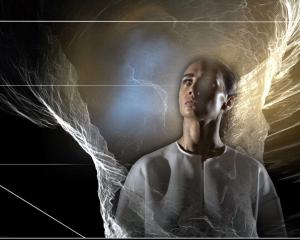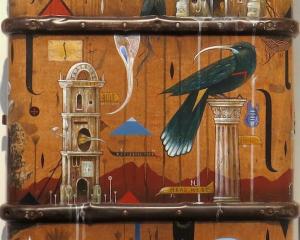
When Caroline Sutton Clark read about the late dancer Caroline Plummer she immediately identified with her.
''I, too, was a young woman who loved to dance and felt I wanted to bring dance to as many people as possible to make the world a better place.
''Reading her words as to how she believed this and her intentions for the fellowship brought me back to the young woman I was way back when and that idealism I felt as a young woman.''
Clark is this year's recipient of the University of Otago's Caroline Plummer Fellowship in Community Dance which was established in 2003 in honour of her achievements in dance and scholarship all while being diagnosed and treated for cancer.
Based in Austin, Texas, Clark, the mother of two girls, had not long finished her PhD in dance when she saw the notice for the fellowship and applied.
''I immediately identified with the description. Everything seemed to fall into place just reading it.''
Reading about Caroline Plummer and her story moved her ''tremendously''.
The timing could not have been better as she felt she had finished one phase in her life and was ready for the next.
''It was the right time as I was completing one phase of my life and to reconnect with that self embarking on a new phase on my life.''
The fellowship seemed to dovetail perfectly with her work in documenting dancers' stories. ''It resonated with my path in life.''

Since 2008, she has been volunteering at the Austin Historical Centre recording the oral history of dancers. She discovered there were very few dancers' stories recorded, studied or written about.
''This gets their voice into the archives so their voices aren't lost.''
As dance is such a tough career to pursue there were often amazing stories to be heard.
''One of the great joys of my life is to sit down and have a cup of coffee with a dancer and just listen; they have the most extraordinary life experiences and tell what is most meaningful to them.''
Her volunteering work led her to undertake her PhD on the subject so when she read the description of the fellowship, ''to support and advocate for the community'', she thought she was already immersed in doing that work.
''It is the right project at the right time. So I crossed my fingers and applied for it. I was over the moon to have the opportunity to be here.''
She admits applying for the fellowship was quite ''audacious'' given she had two daughters aged 12 and 10 years old. But the family made the decision together.
''They were thrilled. I explained it's a once-in-a-lifetime opportunity. I felt it was the right thing and time for me and had their complete support.''
The girls had visited her for 10 days in March and will be coming back for another visit in June and July.
''They've never travelled outside of the United States so at their ages it's the right thing at the right time to broaden their life experiences.''
Clark recognises she is very lucky to have the luxury of six months to focus on what she loves doing.
''I'm not taking this for granted. Because I am a lot more mature, I appreciate that opportunity and the opportunity to just leap into the unknown but with a lot of skills to bear.''
Her project titled ''Dancing Our Stories - Dunedin'' will record the oral histories of as many different dancers and dance types in the city, including Highland, Chinese, African, ballet, hip-hop, salsa, Samoan, as she can find.
''All the usual suspects. Even Ceroc which I had not heard of before I came here.''
Dunedin had a thriving and lively dance community she has discovered, including the likes of dance doyenne Shona Dunlop MacTavish. ''It's exciting.''
She aims to be as diverse as she can be and all her 30-minute interviews will be handed as a collection to the Hocken Library to be available in perpetuity for public listening and future research.
''The community has been wonderfully supportive of the project. It's really a snowball method through word of mouth.
''I'm trying to manage 20 to 30 interviews and I'm already over that.
Clark found most people, even in casual conversation, had a connection with dance even if it was just their parents' experiences at the town hall dances of old or doing kapa haka in school or social dance like folk dancing.
''It's one of those wonderful ways people interacted and got together in social situations.''
That young people today only feel they could dance in clubs is sad, she says.
''Dance has become very sexualised and too loud to talk, so what used to be a wonderful way for people to get together... to have a good time to experience the benefits of not only exercise but socialisation.''
Dance is wonderful for the body and for the soul and did not have to be the kind seen on television.
''I still have this idealism. What I love about oral history interviewing and this project is that it is advocacy, I'm there to listen to people talk about their experience in dance.''
Clark should know. She has been dancing since she was 3 years old, learning a ''little bit of everything'' at a neighbourhood dance studio which her daughters now attend.
She began pre-professional training as a ballet dancer and then in her late teens became a professional dancer.
''It was difficult for me. It wasn't the right fit.''
It was not until she saw her first modern dance production that she realised exactly where she did fit and quit ballet as soon as her contract was up.
She moved to New York to learn modern dance and then decided to do a bachelor in fine arts degree at the University of Michigan, followed by her master's in Hawaii.
''I've always been interested in multiculturalism and felt strongly about dance in all its forms.''
Coming from an academically minded family and having creative curiosity meant following an academic path came naturally, she says.
''Also a career in dance is very, very hard as you are always having to pick up jobs in delis and retail which can be boring. I needed that mental stimulation in addition to dance.''
With her daughters her main priority, she became an adjunct teacher for the faculties of Texas State University and Austin Community College and for a time presented choreography through her company Wicked Cricket Dance Theatre.
She discovered an online PhD programme in dance at Texas Woman's University which allowed her to combine family and study and stay in Austin.
''It meant I could pursue that dream of doing a project about oral history.''
It has been a challenge being in Dunedin so far from home and her girls.
''I do admit to being quite lonely at times but then I just take a walk and there are so many things going on in Dunedin and very quickly I get wrapped up in something and meet new people.''
It had been good for her to experience new things, new culture and a different perspective, she says.
Clark takes at least one photograph a day and writes about it online.
''It's become a joy to have those constant surprises.''












